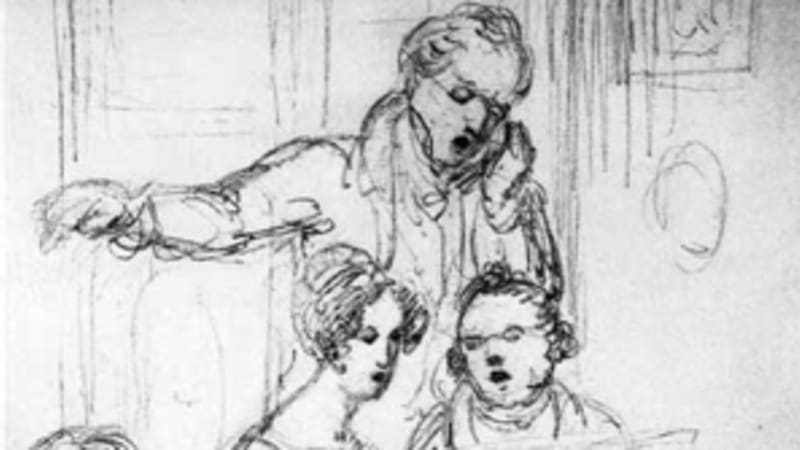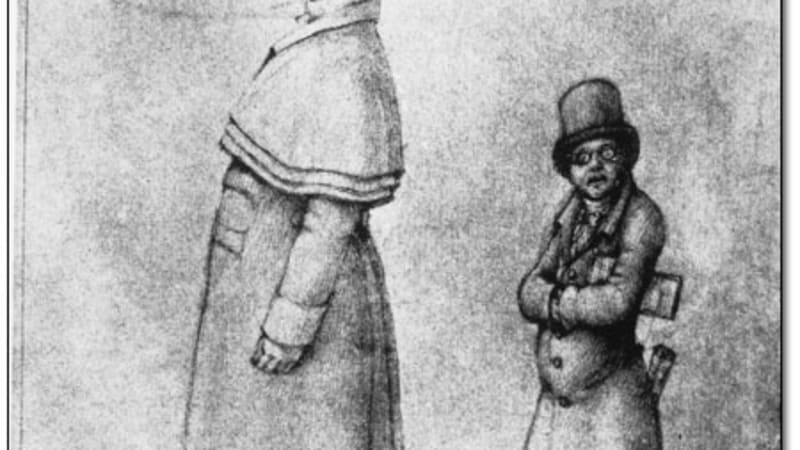Schubert and His Social Circle
January 3, 2018
Schubert died young. Really young. Younger than almost any other famous composer—younger than Mozart, Chopin, or Mendelssohn. He contracted syphilis at 25 and died at 31, which limited his life in many ways but also drove him to be an incredibly prolific composer. His personal life is shrouded in mystery. Schubert wasn’t very keen on marriage for many possible reasons, perhaps because he didn’t have enough money, or because he was gay, or because he thought marriage was a bourgeois institution created to force conformity—or none of those things. In any case, he was a bachelor who lived a life of his own choosing. Schubert’s 20s were a lot like many artists’ and other urban dwellers’ 20s today: he was broke most of the time and lived with roommates, he hung out in pubs and drank heavily, he flirted with leftist political movements, and, most importantly, he had a close but ever changing group of friends to explore art, politics, religion, literature, and, of course, music.

Born in 1797 in Vienna, Schubert grew up with a strict schoolteacher father who encouraged his musical pursuits. Schubert first left home at the age of 11 to serve as a choirboy in the imperial court chapel, a position that included a scholarship to an elite school (“the principal Viennese boarding school for non-aristocrats” according to Grove Music Online). During Schubert’s five years there, he met the first members of what would become his adult circle of friends. Their help later proved instrumental in getting him out of his father’s house and off the path to becoming a schoolteacher, a low-level civil servant job, like his father.
Schubert didn’t just come from a strict family, he also lived in a rather strict society. In the aftermath of two successive defeats by Napoleon during Schubert’s childhood, Austria reverted back to a repressive political regime. He spent his entire adult life in a society with strict government censorship and powerful secret police, and he chafed under the limits of his freedom at various times:
- In 1816, a year after the passage of a law that barred men of lower social classes from marrying unless they had sufficient income, Schubert wrote a tortured diary entry disparaging marriage and the monarchy.
- In 1820, Schubert attended a party that was raided by the police. He spent the night in jail, and his friend the political activist Johann Senn was jailed for over a year and then exiled to his native Austrian Tyrol.
- Later on, Schubert worked on the opera Der Graf von Gleichen even though he knew its plot about bigamy had no chance of making it past the censors.

Schubert was subject to strong controlling forces during his lifetime so perhaps it was natural that of his many friends, the closest was Franz von Schober, a gregarious nobleman who had a reputation as a sort-of self-indulgent pleasure seeker. It seems that everyone who knew Schober either loved or hated him. Many thought he was a bad influence on Schubert, and various mutual friends left negative characterizations of him. According to one, “Schober surpasses us all in mind, and even more so in speech! Yet there is much about him that is artificial, and his best powers threaten to be suffocated by idleness.” Schubert was much more dedicated to his creative work than Schober but he was irresistibly attracted to Schober’s uninhibited way of living. When Schubert first moved out of his father’s home to try to make his living as a musician, he moved into the Schober family flat in central Vienna, and Schober later took credit for liberating Schubert from the life of a schoolteacher.
Schubert “disdained many aspects of traditional bourgeois life, particularly regular employment, institutional religion, conformist thinking, and marriage. Freedom—political, personal, professional, and creative—was extremely important to the way Schubert sought to live his life.”
The Life of Schubert, Christopher H. Gibbs
Given that Schubert was something of a non-conformist, it’s ironic that he was most popular in his lifetime for domestic music. Written for amateurs, music for the home was part of the culture of cozy domesticity in Biedermeier Vienna. And like many Viennese, Schubert avidly participated in home music making throughout his life. He wrote and published many songs and short pieces for piano solo or duo (two people playing one piano). Schubert’s first big hit was Erlkönig. He wrote it in 1815 and it was performed five years later at a private home and then publicly soon after. It promptly exploded in popularity and was published as his Op. 1. A song about death pursuing a child, it features a vivid accompaniment portraying a horse trying to outrun death. The song is both totally genius and clearly written by a melodramatic 18-year-old.
In early 1821, around the time Erlkönig was starting to get noticed, Schubert’s circle of friends began to have their first official Schubertiads, a clever name they came up with to describe evenings devoted to Schubert’s music. Schober was one of the primary participants and they often took place at his home. These performances of Schubert’s music and the encouragement of his friends were major catalysts to his career.
Yet, even at the height of the Schubertiads, when his songs and piano pieces were selling, Schubert wanted to make his name outside the publications that fueled the home music market. In addition to composing nine symphonies, working on a handful of operas that he left in various stages of completeness, and writing string quartets and piano trios, he also worked to bring the smaller genres that he was famous for into the concert hall. He made them longer, more ambitious, and more virtuosic. One such example is “Lebensstürme,” a movement for piano duo. It may have been intended as the first movement of a four-movement work (the name “Lebensstürme”—Storms of Life—was added after Schubert’s death).
Schubert is difficult to characterize. He held strong anti-establishment views while profiting from the celebration of “hearth, heart, and home” that was Biedermeier Vienna. He composed tirelessly (he wrote over 500 songs alone) and still found time for a very active social life. It’s also hard to get a sense of his personality from his friends’ reminiscences of him. Many who knew him described him as having a dual nature. One example, and probably the harshest, was by Josef Kenner, who said that Schubert’s “body, strong as it was, succumbed to the cleavage in his—souls—as I would put it, of which one pressed heavenwards and the other bathed in slime.” Quotes like that raise more questions than they answer but they point to the fact that Schubert lived a marginal existence in a society that celebrated loyalty to the family and the state. Nearly 200 years after his death, he remains an enigma.
Article by Laura Keller, Editorial Manager.





